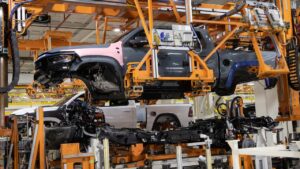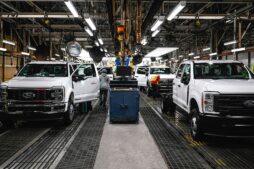Ford CEO Jim Farley: UAW Relationship Shifts.
In September of last year, the UAW made the decision to initiate a strike against Ford, General Motors, and Stellantis. This move was intended to hit the automakers where it hurt the most – their finances. The UAW strategically chose specific plants to target in order to have the greatest impact. One such plant was Ford’s lucrative Kentucky truck plant. As a result, Ford is now taking a cautious approach when deciding where to manufacture its upcoming vehicles.
Ford’s Chief Executive Officer, Jim Farley, recently shared his thoughts on the company’s partnership with the United Automobile Workers (UAW) during the Wolfe Research Global Auto Conference. He emphasized that their relationship has evolved over the years. The Associated Press reported that Farley acknowledged the consequences of Ford’s decision to close its first truck plant, stating that it has had a significant impact on their operations.
Following the halt of Super Duty production in Kentucky, Ford Motor Company Executive Chair Bill Ford made a visit to the Rouge Visitor Center in Michigan, home to the F-150 assembly plant. In his address to union members, Bill urged them to unite and put an end to the ongoing contentious negotiations. He expressed his concern over the repercussions of the Louisville factory shutdown, stating that it has negatively affected the livelihoods of “tens of thousands of Americans.”
The workers at Ford’s Louisville plant started their strike on October 11, about a month after the UAW began its own strike, causing an additional 8,700 employees to join the picket line. As talks continued, the union set its sights on halting production of Ram 1500 trucks, as well as Chevrolet Suburbans and Yukons. However, Ford has the largest amount of unionized workers out of the three auto companies.
In late October, the UAW called off their strike after striking deals with Ford, Stellantis, and General Motors just in time for Halloween. By Thanksgiving, the UAW members had voted to approve all three contracts, effectively bringing an end to the six-week long conflict. This resulted in numerous benefits for the workers, including salary increases, improved perks, eliminating the two-tiered employment system, and other advantages.
The surge in wages and perks will result in a hike in car prices. According to Ford, their cars will see an increase of $900 as a result of the new agreement coming into play. Just like its counterparts in the market, the car manufacturer is adjusting to the shift towards electric vehicles. It has had to reevaluate its approach, with a focus on producing smaller and more reasonably-priced EVs to combat rising competition from Chinese companies.
Source: Associated Press





